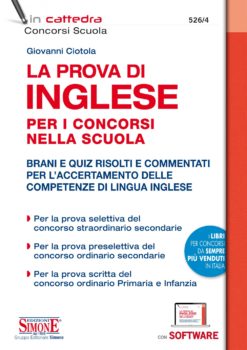Concorso scuola straordinario e inglese nella prova scritta. Anche se è stato ormai sospeso per una manciata di giorni il concorso docenti straordinario, abbiamo pensato di focalizzare l’attenzione sulla prova scritta. Questa è la volta della lingua inglese che spaventa un po’ tutti i candidati che si preparano a sostenere la prova. Continuano ad arrivarci segnalazioni sulla presenza di quesiti in lingua inglese non particolarmente complessi e perfettamente in linea con le tipologie che abbiamo inserito all’interno dei nostri manuali dedicati.
Concorso scuola straordinario e inglese: esempio
Si riporta di seguito un esempio di brano in lingua inglese con domande tipo, così come sono state somministrate in sede di concorso.
Leggi e comprendi il brano. Prova, infine, a rispondere alle domande di seguito.
The WebQuest (“WQ” acronym) is a new methodology based on the Web integration in education: an activity-oriented research where the information, that students learn, comes fully or partly from resources within the Internet. This involves offering students opportunities for informal learning, promoting more cognitive skills destined to have a considerable relapse in terms of education, since it is aimed at creating a personal journey, where a person builds his/her knowledge in an active way.
For the “WebQuests” creation in a “digital” format, the teacher can accomplish his/her work with a simple file (text or PowerPoint), or he/she may connect to sites that provide free online service or by using Learning Object (LO) digital capacity, which is particularly appropriate.
Blogging is a “tool” that allows:
• the “interaction” of several codes, from the iconic to the text;
• and the simultaneous “expansion” of two key language skills, reading and writing.
A blog has as its main feature a main page that lists various posts, articles which can be arranged chronologically by order or category, as you prefer. Visitors have the opportunity to talk to the blog’s administrator by comments they leave on “posts” they are interested in. Also, you can create a blog in the blogroll, that is a list of “links”, usually categorized in Web sites.
As for teaching, you can use it to:
• open a window on children’s world, talk to them about certain subjects;
• develop themes;
• and publicize the classroom activities during the school year, constantly giving information through the school Web site, to make visible and known, to each member of the school community, everything is produced in the classroom through the created blog.
Quesito inglese: il quiz
1. The WebQuest is:
A) a methodology based partly on Web resources
B) a theory-oriented research
C) an educational approach which makes students learn by Web sources
D) a new process based on educational integration in Web
2. Through this innovative educational technique called “WebQuest”, students:
A) can build their own knowledges by Internet sources
B) make use of a theoretical way of learning
C) follow someone’s personal itinerary
D) are passive learners
3. “Learning Object digital capacity” means that:
A) students can create a PowerPoint file
B) students may connect to free Internet sites
C) teachers can use Microsoft Word Office
D) teachers can use digital sources to support learning ability
4. According to the text, blogging allows the simultaneous “expansion” of the following language skills:
A) learning and reflection
B) speaking and writing
C) reading and writing
D) writing and talking
5. According to the text, which one of the following statements is ‘false’?
A) The teacher can use a blog to talk to students about some subjects
B) The teacher can use a blog to develop themes
C) The teacher can use a blog to publicize the classroom activities
D) The teacher can use a blog to create a competitive atmosphere in the classroom
Scorri fino alla fine dell’articolo per sapere quali sono le risposte esatte.
Come prepararsi in inglese
Questo e molti altri quesiti simili sono stati inseriti nel nostro manuale specifico dedicato all’inglese nei concorsi scuola.
Infatti, la lingua inglese è presente:
- nel concorso ordinario per le scuole secondarie, nell’ambito dell’eventuale prova preselettiva con quesiti a risposta multipla, oltre che nella prova orale;
- nel concorso ordinario per la scuola dell’infanzia e per la scuola primaria, in sede di prova scritta, la quale comprende un quesito articolato in 8 quiz a risposta multipla, allo scopo di verificare la comprensione di un brano in lingua;
- nel concorso straordinario per le scuole secondarie, durante la prova selettiva scritta, anche in questo caso mediante quiz a risposta multipla.
Risposte esatte
- C
- A
- D
- C
- D
Se hai suggerimenti, commenti o correzioni da segnalare, scrivi a blog.simoneconcorsi@simone.it































